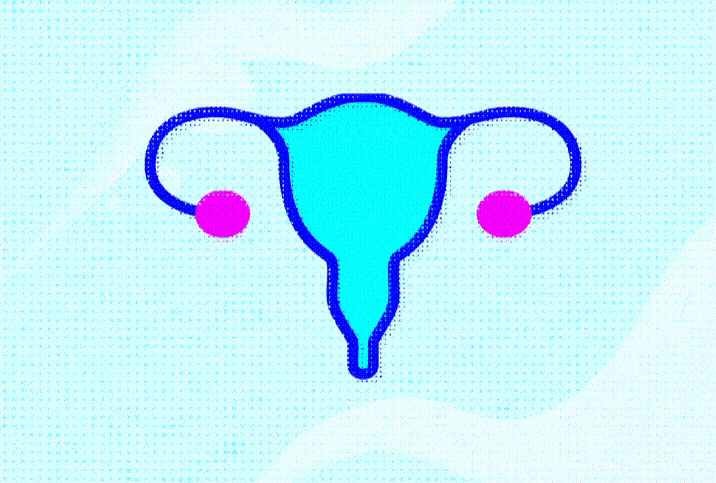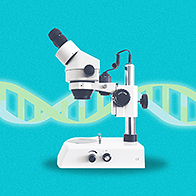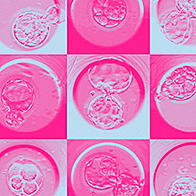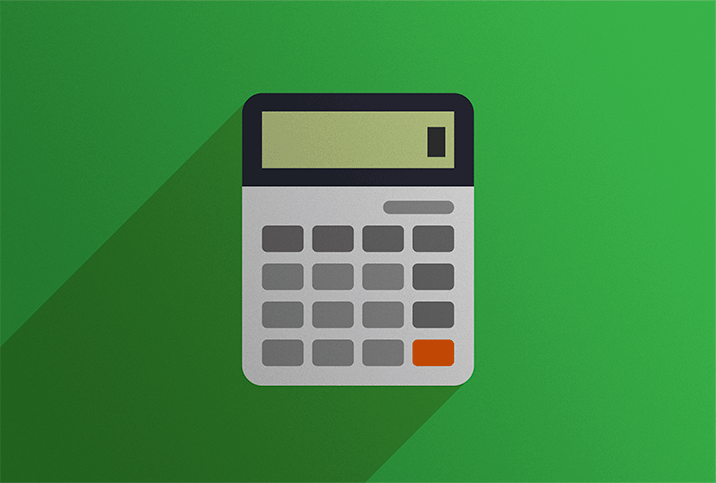What You Should Know About This Rare Fertility Treatment Side Effect

Starting a family can be challenging enough even without fertility issues. Fortunately, treatments like in vitro fertilization (IVF) and ovulation induction can help millions of hopeful parents conceive. Fertility treatments are typically very safe, but as with any medical procedure, they're not without risk.
One possible complication is ovarian hyperstimulation syndrome (OHSS), a side effect of the hormone-stimulating medications used in fertility treatment cycles. If you're currently undergoing fertility treatment or are considering doing so, here's what you need to know about OHSS and how to prevent it.
What is ovarian hyperstimulation syndrome?
OHSS is considered an "iatrogenic" complication, meaning it occurs from medical treatment itself, not an underlying condition. In the case of OHSS, it is caused by the hormone therapy used in specific fertility treatments.
"The syndrome is a side effect of the medications that we give for an in vitro fertilization cycle to harvest eggs," said Jane Frederick, M.D., FACOG, a board-certified reproductive endocrinologist at HRC Fertility.
Specifically, the condition involves an exaggerated response to fertility medications, resulting in high estradiol levels, overabundant growing follicles and swollen ovaries, which can cause fluid buildup in the abdomen.
Ovarian hyperstimulation syndrome typically occurs with the use of injectable medications, especially gonadotropins, which are used during fertility treatments. But in rare cases, OHSS can result from other medications. Even more rarely, it can occur in people not undergoing IVF.
OHSS is a risk for all IVF patients, though severe forms of the condition are extremely rare. Mild cases are common, and symptoms occur in up to one-third of all IVF courses, but moderate forms of the syndrome only occur in about 3 to 6 percent. Severe instances occur just 0.1 to 3 percent of the time.
Typically, OHSS will develop three to seven days after egg retrieval surgery.
Why does it happen?
During in vitro fertilization, people receive fertility medications, including hCG (human chorionic gonadotropin), to stimulate hormones that stimulate egg maturation and release in the ovaries. These medications boost the chances of successful IVF treatment, helping the body mature many eggs instead of the one egg released in a regular ovulation cycle. HCG, specifically, helps the eggs mature and begin meiosis, the process in which the egg releases half of its chromosomes before ovulation.
'Instead of 10 eggs, they may have 50.'
If too much hormone is administered or the ovaries are overly sensitive to the stimulation, the ovaries may produce too many follicles (which house the eggs).
"Instead of 10 eggs, they may have 50," said Frederick. With injectable IVF treatments, the goal is typically to produce 10 eggs, while oral medications aim to produce two.
The excessive response can cause the ovarian blood vessels to react adversely and leak growth fluid during egg retrieval.
"We don't know the exact [cause], but we do believe there are some growth factors found in the ovaries that are very sensitized to the effects of the stimulation drugs, and these growth factors are leaking out from the follicle at the time of surgery," said Frederick. "They can cause the types of symptoms that you're feeling, which is an accumulation of a lot of fluid in the abdomen that needs to get absorbed to allow the patient to recover."
What are the symptoms?
Mild forms of OHSS usually present with bloating, abdominal weight gain and constipation, according to Suzie Devine, R.N., MSN, an IVF/fertility nurse turned founder of women's health startup Binto.
Abdominal discomfort and difficulty urinating are common symptoms as well, said Frederick.
"In severe cases, symptoms include vomiting, rapid weight gain, shortness of breath and blood clots," Devine added.
If you experience symptoms of OHSS after treatment, talk to your doctor immediately. Even mild cases of OHSS should be monitored closely to make sure moderate or severe symptoms do not develop. While extremely rare, severe cases can be life-threatening.
What are the risk factors?
OHSS can happen to anyone undergoing fertility treatment, but there are certain risk factors, said Sanaz Ghazal, M.D., cofounder and medical director of RISE Fertility.
Most cases develop in people under age 35.
Other risk factors include:
- Previous occurrence of OHSS
- Using fresh versus frozen eggs in an IVF cycle
- A low body mass index (BMI
- High estrogen levels
- High doses of hCG
"There is also a higher incidence of OHSS in women with a diagnosis of ovulatory dysfunction or polycystic ovary syndrome (PCOS)," Ghazal said. "Another way to assess risk for OHSS is to look at ovarian reserve markers like an antimüllerian hormone (AMH) or an antral follicle count (AFC). High AMH levels or a high AFC are associated with an increased likelihood of developing OHSS."
Can you prevent OHSS?
Fortunately, according to Ghazal, there are several strategies you and your doctor can use to decrease your risk of OHSS.
"Your doctor may adjust the dose of medications during stimulation, use different medications to help prepare your eggs for retrieval or give you medications to take after retrieval," she said.
According to Kimberley Langdon, M.D., an OB-GYN at Medzino, replacing hCG with gonadotropin-releasing hormone agonists or recombinant luteinizing hormone and using agonist protocols, dopamine agonists and mild stimulation can reduce the risk.
"If you're at high risk, work with your doctor to make sure you're on a high responder protocol. This will allow you to trigger (the prep for IVF retrieval) with a drug called Lupron rather than having to take the traditional trigger shot, which is made of hCG," said Devine.
Lupron is a medication that allows the egg to be harvested while providing the ovaries with an opportunity to absorb the leaked fluid and recover more quickly.
Doctors may also recommend the medication metformin for people with PCOS.As for at-home prevention techniques, Ghazal suggests eating a high-protein diet and drinking plenty of high-electrolyte fluids.
Are there long-term health effects?
Most patients do not experience any long-term effects from ovarian hyperstimulation syndrome. However, those with severe cases may experience serious or long-term health impacts.
"OHSS is not something to mess around with, which is why most doctors today are extremely careful with medication protocols for patients at high risk," said Devine. "Severe cases can cause blood clots, kidney failure, ovarian torsion, miscarriage and, in rare cases, death."
Fortunately, for most people, symptoms dissipate as soon as the hormone levels return to normal.
"Once OHSS has resolved, there are usually no long-term impacts on future health and pregnancy," said Lauren Sundheimer, M.D., M.S., FACOG, of Newport Fertility Center, a CCRM Orange County Clinic. "Having had a history of OHSS, however, does put you at risk for it again in a future cycle."
What are the treatment options?
Mild cases of OHSS typically resolve on their own within 5 to 10 days. Treatment mainly consists of avoiding strenuous exercise and increasing fluid intake, along with taking over-the-counter pain relievers. Your doctor will also likely ask you to monitor your symptoms and seek care immediately if your condition worsens.
If you get pregnant while experiencing OHSS, symptoms may persist for several days or a few weeks.
Frederick explained pregnancy also stimulates growth factors, so if someone is high-risk or develops moderate or severe OHSS, their doctor will most likely recommend a freeze-all cycle. This means the eggs are frozen rather than transferred until the patient recovers completely.
"A frozen embryo transfer once your hormones and ovaries have recovered is not only safer for you, but it's also associated with a higher success rate," said Ghazal. "Developing OHSS during or after an IVF cycle does not prevent you from doing a future IVF cycle, but your doctor may want to make some adjustments to your treatment plan to minimize the risk of developing OHSS again."
Severe OHSS typically requires hospitalization, as it can be life-threatening if left untreated. A doctor may admit you to the hospital if you're in severe pain, having trouble staying hydrated or your symptoms are not improving with intervention. You might be given intravenous (IV) fluids to prevent dehydration and a blood-thinning medication to prevent clots. If fluid has entered the lungs, you may need a medication called Cabergoline to remove it. Or, if a significant amount of fluid is in the abdomen, the doctor may perform a paracentesis to remove it.
Severe cases of OHSS are rare, but if you're concerned about developing this condition, don't hesitate to talk to your doctor about options to reduce your risk. If you're currently undergoing IVF and develop symptoms, monitor them closely and alert your doctor immediately. There are many options to reduce the risk without compromising your health or fertility.



















